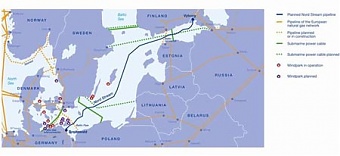Ecology, Energy, Estonia, EU – Baltic States
International Internet Magazine. Baltic States news & analytics
Thursday, 18.04.2024, 05:06
Risks connected to Nord Stream are underestimated
 Print version
Print version |
|---|
The construction of the 1,200 km Nord Stream pipeline will be launched next year: Nord Stream has already received permission from Finland to destroy mines that will be on the route of the pipeline and that work will be started this month.
The Estonian Environment Ministry working group on this issue still warns that problems it has pointed out before, are still acute.
Estonian Academy of Sciences Nature Protection Committee member Ivar Puura said that there are two types of issues, the ones that will certainly accompany building the pipeline and the ones that are less likely but have a more catastrophic result, like explosion of the pipeline, malfunctioning or gas leaks.
''As for the latter, the analyses of Estonian scientists show that the evaluations of Nord Stream experts may be a hundred times underestimated, i.e. the risk for the pipeline to explode in the next 50 years may reach even 30%, according to some calculations,'' said Puura.
The other circle of problems is all the unpleasant phenomena that will definitely accompany the pipeline, like environmental toxins that will be released when the pipeline is installed and when the mines are detonated. ''With dioxins, the important thing is that they hurt small children, infants most, since in breast milk the concentration of dioxins is amplified 50 times,'' said Puura.
Estonian Environment Ministry Deputy Chancellor Harry Liiv added that the issues of compensating possible environmental damages are also unsolved. "If as the result of the construction activity the environmental situation deteriorates, and we know that the developer causes it, then it is logical that it would be compensated to the Baltic Sea states,'' Liiv said.
Next week, the environmental dangers connected to Nord Stream will be discussed at a joint session of Estonian Parliament (Riigikogu) Environmental, Economy and Foreign Committees.








 «The Baltic Course» Is Sold and Stays in Business!
«The Baltic Course» Is Sold and Stays in Business!

